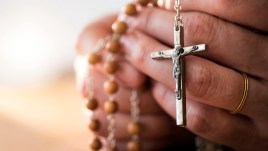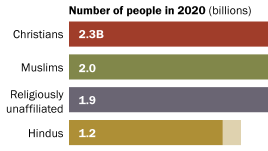
How religious is your state?
Explore our interactive database to find out how religious adults are in your state based on service attendance, prayer, belief in God, and importance of religion.
Numbers, Facts and Trends Shaping Your World
Explore our interactive database to find out how religious adults are in your state based on service attendance, prayer, belief in God, and importance of religion.
All
Publications
Key West, Florida Speaker: Michael Gerson, Speech Writer and Policy Adviser to President Bush Respondent: Carl Cannon, White House Correspondent, National Journal Moderator: Michael Cromartie, Vice President, Ethics and Public Policy Center In December 2004, 24 of the nation’s leading journalists gathered in Key West, Florida, for a private briefing on religion and politics, sponsored […]
10:00am-11:30am Washington, D.C. Speakers: Ambassador Robert A. Seiple (Ret.), Founder and Chairman of the Board, Institute for Global Engagement; co-editor, Religion & Security Colonel Charles P. Borchini, USA (Ret.), Research Fellow, Center for Emerging Threats and Opportunities, USMC Moderator: Dr. Pauletta Otis, Senior Fellow in Religion & International Affairs, Pew Forum on Religion & Public […]
In contrast to abortion, gay marriage and other hot-button cultural issues, which divide most religious groups in the United States, there is a fairly strong consensus across faith traditions on environmental policy, according to recent polls sponsored by the Pew Forum on Religion & Public Life. Nevertheless, conservative Christians and some minorities are not quite […]
Bryan Hehir, Michael Walzer, Charles Krauthammer, Louise Richardson, and Shibley Telhami Pew Forum Dialogues on Religion & Public Life E.J. Dionne Jr., Jean Bethke Elshtain, Kayla Drogosz, Series Editors Executive Summary (.pdf) Order the book Save 20% with discount flyer How a nation “commits itself to freedom” has long been at the heart of debates […]
10:00am-11:30am Washington, D.C. MR. BOB WEINBERG: Friends, we are about to begin the program while you continue to enjoy this delicious luncheon. And the speakers, I’m sure, will be up to the challenge of competing with the clacking of the knives and forks. I’m Bob Weinberg, the president of the American Association of Jewish Lawyers […]
Noon – 2 p.m. Westminster, London, England Speakers: The Rt. Rev. Dr. Josiah Idowu-Fearon, Archbishop, Anglican Church of Nigeria The Most Rev. Frank T. Griswold, Presiding Bishop, Episcopal Church USA Dr. David Martin, Professor of Sociology, London School of Economics (Emeritus) Moderator: Dr. Timothy Samuel Shah, Senior Fellow in Religion & International Affairs, The Pew […]
10:00am-Noon Washington, D.C. Speakers: J. Bryan Hehir, Parker Gilbert Montgomery Professor of the Practice of Religion and Public Life, John F. Kennedy School of Government, Harvard University Charles Krauthammer, Columnist, The Washington Post* Walter Russell Mead, Henry Kissinger Senior Fellow, Council on Foreign Relations Louise Richardson, Executive Dean, Radcliffe Institute for Advanced Study, Harvard University […]
10:30am-Noon Washington, D.C. Speakers: Richard Land, President, Southern Baptist Convention’s Ethics & Religious Liberty Commission Robert Tuttle, Professor of Law, George Washington University Law School Ronald Walters, Director, African American Leadership Institute; Professor of Government and Politics, University of Maryland Moderator: Luis Lugo, Director, The Pew Forum on Religion & Public Life LUIS LUGO: We […]
Note: An updated version of this report is now available as Politics and the Pulpit: 2008. During every election cycle, many religious congregations find themselves wondering what role, if any, they can play in the political process. Can a minister, rabbi, imam or other member of the clergy endorse a candidate from the pulpit or […]
Plurality Sees Islam as More Likely to Encourage Violence
Nearly half of U.S. adults are connected to Catholicism. Read about going to Mass, Communion, confession and more.
Christians remain the largest religious group, and Muslims grew the fastest from 2010 to 2020. Read how the global share of Buddhists, Hindus, Jews and the religiously unaffiliated changed.
After years of decline, the U.S. Christian share now shows signs of leveling off. The new Religious Landscape Study explores trends in identity, beliefs and practices.
The Global Religious Futures (GRF) project is jointly funded by The Pew Charitable Trusts and The John Templeton Foundation. Here are some big-picture findings from the GRF, together with context from other Pew Research Center studies.




